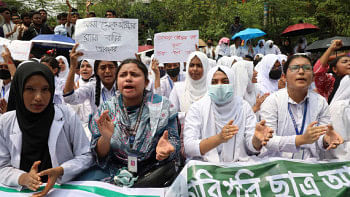Pandemic: Economic Fallout: Turnaround still not happening

Centre for Policy Dialogue yesterday said the slow implementation of development programmes and depressed private investment were concerning for the economy still recovering from the pandemic fallout.
The independent think tank made the remark at a virtual press briefing on State of the Bangladesh Economy in fiscal 2020-21.
The government has taken several initiatives to mitigate people's sufferings and to overcome the fallout, but the much-expected turnaround is still not here, the speakers said.
CPD's Senior Research Fellow Towfiqul Islam Khan said growth in revenue collection has started to pick up the pace, but implementation of development programmes remains slow.
Total revenue mobilisation recorded at 13.4 percent have grown in the first ten months of this fiscal year, he said presenting the keynote paper, adding that the government has to attain an astounding 122.8 percent growth in the remaining two months to achieve the target for this fiscal.
The CPD suggested taking an expansionary fiscal policy by raising revenue collection in the coming year.
But it added that there is no scope to impose fresh taxes or hike the existing levies given the bad state of the economy.
To improve the revenue mobilization, the government should take effective measures to tackle tax evasion and money laundering, it said.
As of April, the rate of implementation of the total public expenditure was 42 percent of the annual target of Tk 567,999 crore.
Such a low level of budget implementation is seriously concerning at a time when the economy is ravaged by the adverse impacts of the pandemic, it added.
On top of that, only 48.7 percent or Tk 102,730 crore of the total outlay of Tk 209,272 crore was spent in the first 10 months.
Among the top 10 ministries and divisions, implementation remains the lowest in the Health Services Division, only 31.3 percent, said Towfiqul.
Given the increased pressure on the public health service sector in view of the Covid-19 pandemic, the current scenario is in stark contrast to the citizen's expectations and the realities of the demands on the ground, he said.
CPD Executive Director Fahmida Khatun said increasing the allocation for the health sector might not bring any good because of frequent irregularities and corruption.
The attention should rather be on implementing the current allocation properly, she said.
CPD's Distinguished Fellow Mustafizur Rahman said a portion of the funds for the health sector should be used to strengthen the 16,000 government community clinics by recruiting employees and procuring equipment, he said.
The coming budget should focus more on equity, redistributive justice, protecting jobs and saving lives, and less on economic growth, Towfiqul said.
The budget should set targets in employment and growth of household earning, rather than GDP growth or per capita income.
A large number of became unemployed amid the pandemic and a majority of them were reemployed, with many shifted from the services sector to farming.
Their earning and working hours have not restored to the pre-pandemic level. This has subsequently increased the poverty rate and inequality.
In addition, rising trends in food inflation are expected to disproportionately affect the low-income people.
Many people living in the cities and suburbs have become the new poor, but they have not received the cash support and other assistance, he said.
The small and medium enterprises and the low-income professionals have not received the support they expected from the stimulus packages, but the picture is quite different in the large industries, Towfiqul said.
Since the highest share of the liquidity support was offered to the large industries, crony capitalists might take advantage of their strong political foothold to use the banks to obtain more than their fair share of the funds, he said.
The government announced Tk 124,953 crore stimulus funds for 23 sectors amid the pandemic. But private sector credit growth did not pick up.
Private sector credit growth stood at 8.79 percent in March, falling short of the central bank's target of 14.8 percent and indicating a frustrating situation in the investment sector.
CPD Research Director Khondaker Golam Moazzem said banks should provide at least 30 percent of their disbursed loans to new entrepreneurs in the small and medium enterprises.
Despite issuing more than 100 circulars related to the liquidity support packages over the past year, the central bank has not been able to address the regulatory gaps.
This has made some of the government's liquidity support packages available also for poorly governed banks and loan defaulters.

 For all latest news, follow The Daily Star's Google News channel.
For all latest news, follow The Daily Star's Google News channel. 



Comments